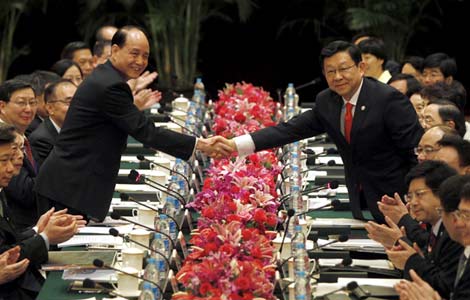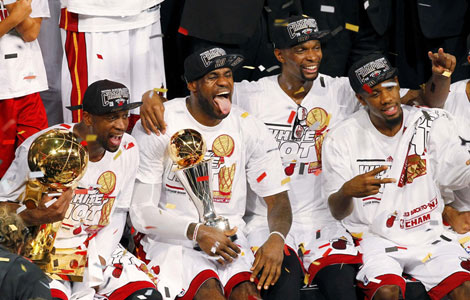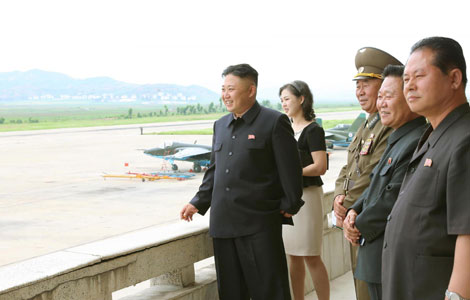Economic confidence levels drop
Updated: 2013-06-22 02:44
By Zheng Yangpeng (China Daily)
|
||||||||
China's entrepreneurs and bankers are becoming more pessimistic about the country's macroeconomic condition, as growth continues its downward trend, two reports by the central bank revealed on Friday.
An index gauging entrepreneurs' confidence on macroeconomic development dropped to 63.8 percent, 4.2 percentage points lower than last quarter and 3.7 percentage points down on the same period last year, said the People's Bank of China.
Of the 5,000 entrepreneurs across the industrial sector surveyed by the PBOC, 36.4 percent regarded macroeconomic development as weakened, compared to 31.9 percent in the first quarter.
"This is a natural result of the continued sluggish economic growth in China," said Xiang Songzuo, chief economist of Agricultural Bank of China Ltd.
China's economy, a crucial driver of global growth, expanded 7.8 percent in 2012 — its slowest pace in 13 years — and recorded a surprisingly weak 7.7 percent expansion in the first quarter this year, well below forecasts.
Recent weakness in the Asian economic giant has prompted some analysts to suggest the central bank ease monetary policies, but officials have refused to budge.
The soaring cost of borrowing has led to a credit crunch, which has sent stocks tumbling and left banks unable to lend.
In a separate PBOC survey, 3,100 bank executives across the country also expressed dampened confidence in the economy.
An overall bankers' confidence index dropped to 64.1 percent, 8.1 percentage points lower than last quarter and 5.7 percentage points lower than a year ago.
A prosperity index for the banking industry also dipped 2.5 percent over last quarter to 77.3 percent.
Xiang said the economy is likely to dip in the second quarter, and fare even worse in the third.
"Even a monetary easing is not going to solve the problem, as loan demand remained weak," Xiang added, a view reflected in the PBOC report.
General loan demand fell by 4.9 percent over the last quarter to 72.5 percent, with drops seen in agriculture, manufacturing and the service industries.
The fall was more severe for small enterprises, which dropped 3 percent compared to 1.9 percent for large companies.
"Financing costs are still high for small firms. This is because they still lack bargaining power with large financial institutions," said Xu Hongcai, a senior financial researcher with the China Center for International Economic Exchange, a think tank in Beijing.
"To reverse the situation, more small to medium-sized financial institutions should be established."
In another report by PBOC, which surveyed 20,000 households countrywide, 59.1 percent regarded product prices as "high", compared to 56.1 percent in the first quarter.
China's CPI, a main gauge of inflation, slowed to 2.1 percent, the lowest in three months.
As the falling inflation rate gave room for monetary easing, analysts said the policy's emphasis has shifted from "preventing inflation" to "stabilizing the growth rate", but simply lowering the interest rate was unlikely to help significantly.

 Obama nominates new FBI director
Obama nominates new FBI director
 Lucky winners get 'best jobs'
Lucky winners get 'best jobs'
 In with old and in with new
In with old and in with new
 Foreigners in Tianjin find a fresh goal to aim for
Foreigners in Tianjin find a fresh goal to aim for
 Pact to boost cross-Straits service trade
Pact to boost cross-Straits service trade
 LeBron leads Heat to second straight title
LeBron leads Heat to second straight title
 Singapore haze at worst yet, schools shut
Singapore haze at worst yet, schools shut
 Kim Jong-un inspects DPRK's air force
Kim Jong-un inspects DPRK's air force
Most Viewed
Editor's Picks

|

|

|

|

|

|
Today's Top News
Agreement heralds further cross-Straits service trade
'Goodwill' voiced in solar row
Investment in US to create jobs
Economic confidence levels drop
Major source for Beijing water plan 'polluted'
Foreigners in Tianjin find a fresh goal to aim for
Jet exporter to spread wings abroad
Obama nominates new FBI director
US Weekly

|

|







